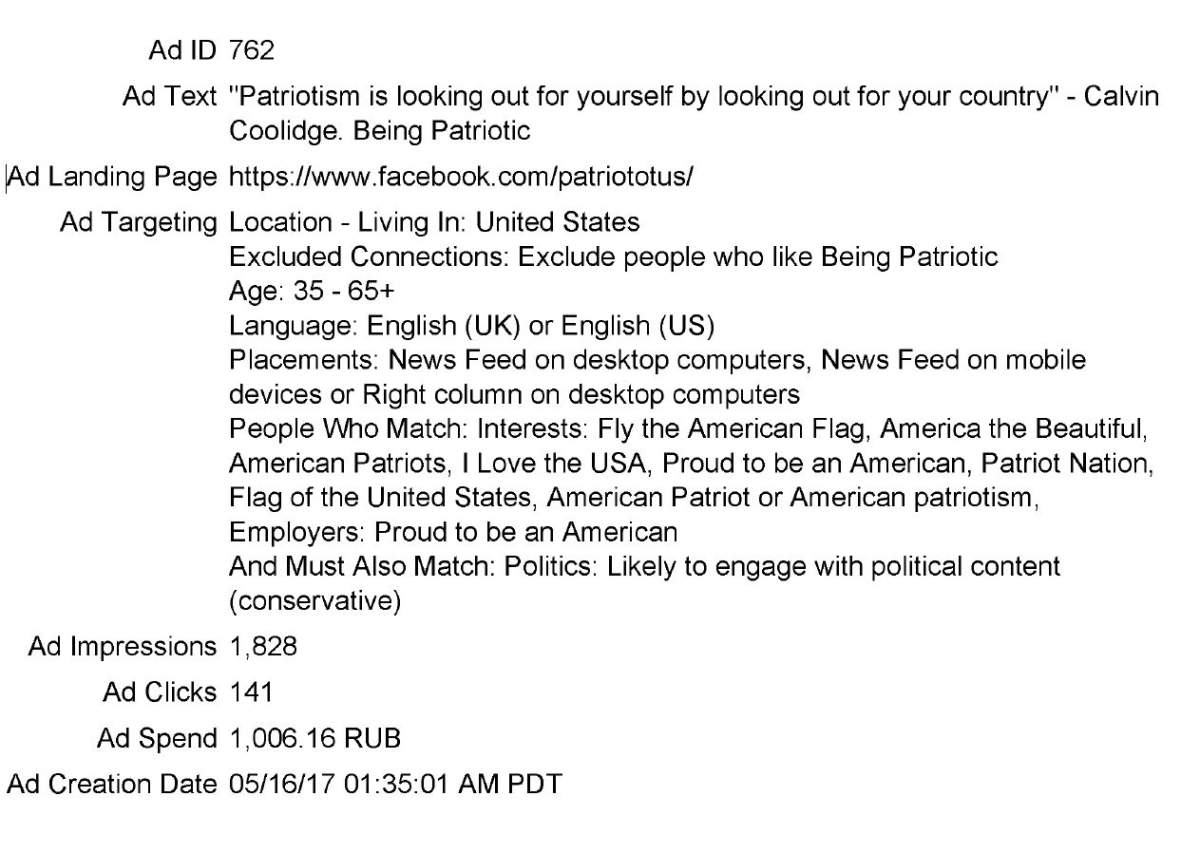This week, Democrats on the U.S. House Intelligence Committee released over 3,500 Facebook ads bought by the St. Petersburg-based Internet Research Agency between early 2015 and late 2017.

You can see them here (the format isn’t user-friendly — there’s no index, and each ad is an individual pdf file.)
Some did well and some did badly, but they had a few things in common.
The ads seem to be based on exploiting any source of division that appeared, no matter what its source was. The 50 or so that we looked at, published in May of 2017, were a mixture of memes mostly aimed at conservative hyperpatriots, Black Lives Matter supporters and Muslims.
The hyperpatriot ads seem interesting mostly because they seem designed to guide readers toward isolationism.
First, though, we need to step back and look at the inherent irony.
Here’s one ad placed by the IRA-operated Facebook group Being Patriotic:
And here’s the metadata. As we can see, it was aimed at people over 35 in the United States with a Facebook interest match for various patriotic causes and conservative politics. The price: 1,006 rubles, or $16.26 U.S.
Here’s another Being Patriotic ad, with the shaky English that many of the ads show. This one cost Russian taxpayers 500 rubles:
What did the IRA want to do with this audience segment, once they’d been engaged? This third ad, also a 500-ruble buy, hints at the answer:

Get breaking National news
Notice the shaky English: “military commandership” and the missing “the”s.
What the Russians seem to be doing here is gathering a Facebook audience of conservative patriots and then trying to steer them in an isolationist direction. (There are more than a few parallels to America First propaganda memes that were aimed at keeping the U.S. out of the Second World War before Pearl Harbor.)
Over and over, the ads show a really bad grasp of correct English …
… North American English idiom …
… or just logic. (I can’t take any meaning from this one other than “Even though Middle Eastern wars mean we get awesome refugees, they should still stop”
And I wish I’d found this one, but I have to credit Vice:

Another ad, aimed at Americans, referenced a Bollywood film about the 1971 Indo-Pakistani conflict, which was big in India, not so much in the United States. Clicks: one.
Lots of people are looking at these ads other than us — check out the #russianads tag on Twitter.
It’s fairly straightforward to look at what the ads were intended to do; less clear whether they had any effect, which is hard to quantify.
“The only way we can begin to inoculate ourselves against a future attack is to see firsthand the types of messages, themes and imagery the Russians used to divide us,” said congressman Adam Schiff, a member of the committee.
Perhaps it’s the best we can do for now.

In brief:
- Five Swedish publishers recently started a fact-checking site. More or less immediately, a fake fact-checking site sprouted up, copying the real one’s design and layout. “This is not the first time Sweden has seen a fake fact checker, although it is the first case of a copycat version of a real fact checker, with the obvious aim to confuse the audience and discredit fact checking,” EU Mythbusters explains.
- Siri and Alexa can be made to obey secret commands pitched too high for the human ear, the New York Times reports. Researchers ” … demonstrated they could control voice-activated devices with commands embedded in songs that can be broadcast over the radio or played on services like YouTube.”
- Facebook is set up to make social connections efficiently. One context in which that happens: introducing thousands of ISIL sympathizers to each other on the platform, the Telegraph reports. The issue came to light when a counter-terrorism researcher, in contact with an ISIL member on the platform, was “within hours … inundated with friend suggestions for dozens of extremists.”
- Mother Jones is assigning a reporter to work on covering disinformation full-time, with a mandate to trace it to its source. “We want to get behind the torrent of day-to-day falsehoods and propaganda to identify where it comes from,” editor-in-chief Clara Jeffery writes.
- Buzzfeed looks at the booming market in fake reviews on Amazon. “Sellers trying to play by the rules are struggling to stay afloat amid a sea of fraudulent reviews, and buyers are unwittingly purchasing inferior or downright faulty products. And Amazon is all but powerless to stop it.”












Comments